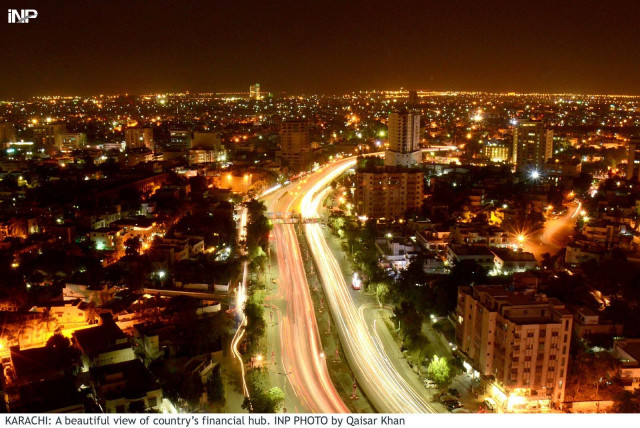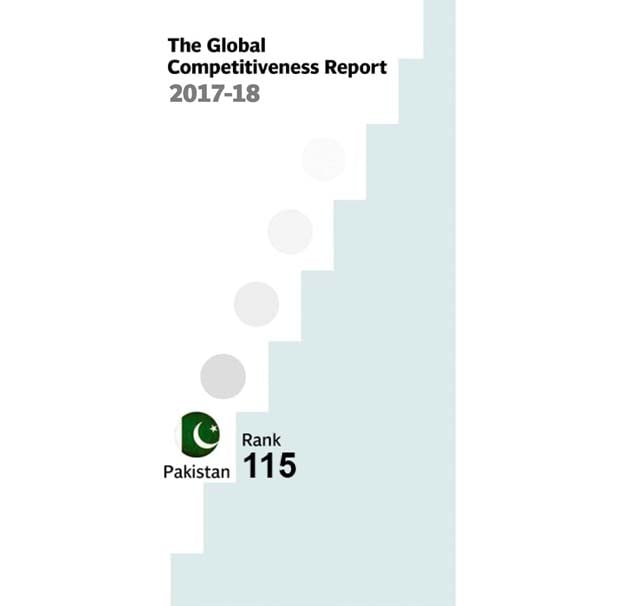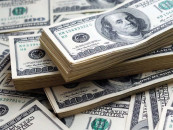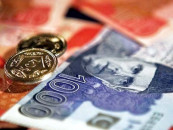Pakistan crawls out of bottom-20 in Global Competitiveness Index
Makes overall improvement but remains last in South Asia

PHOTO: INP
The 2017-18 Global Competitiveness Report, which compared governance in 137 countries this time as opposed to 138 in the previous year, ranked Pakistan at 115th - 22 places from the bottom, compared to 16th from the bottom last year. Last year, the WEF had conducted survey in 138 nations and Pakistan was placed at 122. Overall, Pakistan jumped seven positions, but the performance remains sub-par when compared with the amount of stress and priority laid on the country’s competitiveness.
Economy needs structural change, but transition is painful
Corruption remained the most problematic factor for doing business in the country for the third consecutive year, followed by high tax rate, according to the Global Competitiveness Report 2017-18 that the WEF released on Tuesday. The other troubling factor was that on the pillar of primary health and education, the country stood at 129 - one notch below last year’s level and at bottom 8th among 137 nations.
Similarly, on labour market efficiency, the country was ranked at 128th, a big question mark on Islamabad’s ability to take full advantage of the China-Pakistan Economic Corridor in the longer run.
This year, among 114 global competitiveness indicators, Pakistan showed improvements on 82 key indices, whereas on 20 indices the country lost its previous position. In 12 indices, the position remained the same as last year.

CREATIVE COMMONS
The report is an annual assessment of the factors driving countries’ productivity and prosperity. The WEF defines competitiveness as the set of institutions, policies and factors that determine the level of productivity of a country.
Pakistan’s ranking at 115 is measured by 12 pillars of Competitiveness. On the institutions pillar, Pakistan improved 21 ranks and stood at 90 from 111 last year. Infrastructure improved from 116 to 110, on the macroeconomic stability pillar Pakistan improved 10 ranks and stood at 106.
An encouraging sign, according to the survey, was that the trust of people on politicians further improved and the country’s ranking on this indicator stood at 62 this year compared with 85 in the previous year. Judicial independence was further strengthened and the country secured 80th position -eight notches better the previous year.
Pakistan has shown improvements on some of the key indicators to improve its global competitiveness, said Amir Jahangir, Chief Executive Officer of Mishal Pakistan, the country partner institute of the WEF.
On other pillars, among 137 countries, Pakistan was ranked 129th on Health and Primary Education, losing one rank from last year, Higher Education and Training improved from 123 to 120, Goods Market Efficiency 107, Labour Market Efficiency 128, Financial Market Sophistication jumped from 107 to 96 and Technological Readiness 111.
On maintaining regional competitiveness edge, Pakistan was ranked 28 on the pillar of market size. The country also showed sustained improvements on business sophistication as the rank changed from 95 to 81 in 2017, while on the Innovation pillar there was an improvement of 15 points and Pakistan was ranked at 60th position on the global competitiveness index.
Compared with its regional peers, Pakistan ranked at the bottom. Among the six surveyed nations, India was at top on 40th position, although it slipped a notch. Bhutan was at 82nd position and second most competitive economy in South Asia, followed by Sri Lanka 85, Nepal 88 and Bangladesh 99.
The Global Competitiveness Report 2017-2018 also identifies Corruption as the most problematic factor for doing business in Pakistan, followed by tax rates, government instability, crimes and inefficient bureaucracy.
Pakistan is now a $300-billion economy
Most state institutions were still ranked at the bottom, for instance the Trade Development Authority of Pakistan stood at 135 among 137 countries. Both the Higher Education Commission of Pakistan and Police Services were at 116, National Electric Power Regulatory Authority 115 and the Auditor General of Pakistan was ranked at 110.
The Intellectual Property Organization was at 97, Judiciary 80, National Highways Authority 76, Civil Aviation Authority 91, National Vocational and Technical Training Commission 99, Competition Commission of Pakistan 70, Pakistan Customs 93, State Bank of Pakistan at 89 and Securities and Exchange Commission of Pakistan at 91.
Published in The Express Tribune, September 27th, 2017.
Like Business on Facebook, follow @TribuneBiz on Twitter to stay informed and join in the conversation.



















COMMENTS
Comments are moderated and generally will be posted if they are on-topic and not abusive.
For more information, please see our Comments FAQ